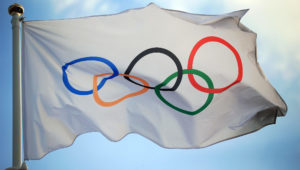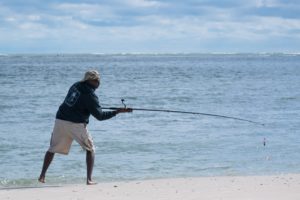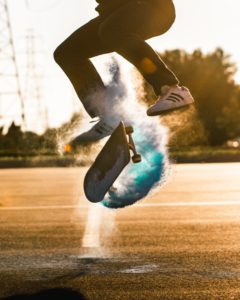
Stronger together: IOC hails partnership with UN on its 75th anniversary and emphasises role of sport in building solidarity
As the United Nations (UN) celebrates its 75th anniversary, the President of the International Olympic Committee (IOC), Thomas Bach, has hailed the collaboration between […]






BIPOC anglers take a stand for inclusivity in fishing
THE 2020 TREND has been to head outdoors to pursue enjoyable activities at a safe distance from others. Like hiking and camping, fishing has skyrocketed […]



IOC and GAISF
Along with the current context, the focus of this event will be a reminder of the urgency and the importance for us to take sustainable decisions for the future of our world, its people and our sports. Long-term strategy needs short-term action.
The agenda includes the topics of resilience, a global perspective on the circular economy and how it can all help your triple bottom line. It will also feature some of the best sustainability practices in the Olympic Movement.
As usual, you will be hearing from many other IFs, athletes and the IOC and GAISF. Among those who you might not recognise are from some of the top leaders in sustainability and sports featuring among others:
- Lord Sebastien Coe – President of World Athletics and IOC Member, member of the IOC Tokyo 2020 Coordination Committee and council member of the ASOIF. He won four Olympic medals and set a total of 12 world records during his athletics career and now leads World Athletics’ commitment to a cleaner, greener, more equitable world.
- Johan Rockström – Director of the Potsdam Institute for Climate Impact Research, Johan is an internationally recognised scientist on global sustainability issues. He led the development of the Planetary Boundaries framework for human development, a system for government and management agencies as a precondition to sustainable development. Author of over 150 publications and advisor to the World Economic Forum, the United Nations Sustainable Development Solutions Network and the UNFCCC among others.
- Nina Seega - Research Director for Sustainable Finance at the Cambridge Institute for Sustainability Leadership (CISL). She is an expert in the use of risk management tools to address environmental sources of risk in the financial sector. Since 2016 she has co-led the CISL team serving as Knowledge Partner for the risk analysis track of the G20 Green Finance Study Group.
- Giulia Carbone - Deputy Head of IUCN’s Global Business and Biodiversity Programme. She is in charge of the Aluminium Stewardship Initiative and the development of a standard for aluminium sustainability. Before joining IUCN, Giulia worked for 8 years for the United Nations Environment Programme’s Division of Technology.
- Antonia Gawel - expert on clean energy, environment and sustainability policy. Currently heading the World Economic Forum's Circular Economic Initiative, she has worked in Bhutan as an advisor on environment and clean energy programmes and at the International Energy Agency (IEA).
Download the program here

Since the launch of its guidance document – Active Travel Guidance for Sports Stadia – in May 2019, Healthy Stadia has been working with a number of pioneering European clubs and stadia operators on the development of case studies offering further insight into the promotion of walking and cycling to sports stadia. The first of these case studies to be published is from colleagues at KAA Gent, profiling a comprehensive active travel strategy that has been led by their Football in the Community department. Based at the newly built Ghelamco Arena (20,000 capacity), the club has a serious commitment to active travel, and has developed a major mobility programme for supporters over the last three years, promoting: walking, cycling park and ride shuttle busses, regional bus routes for supporters, and, carpool parking spaces near to the stadium. Under the campaign title, ‘Cycling Buffalo’s’, KAA Gent have been able to install 2838 permanent cycle locking stalls, with another 600 mobile stalls, with an average of +15% of KAA Gent supporters coming to the Arena by bicycle – see below to download the full case study. Healthy Stadia will be publishing a second active travel case study that has been developed with Gdansk Letnica Stadium in the December edition of our newsletter, whilst we invite any stadium operators and/or clubs who are interested in showcasing their own work on active travel to contact us for further details on developing a case study.




FIAS issues the “strategy for sustainable development” by 2030
This autumn the International SAMBO Federation launched Sustainability Strategy 2030. The FIAS Sustainability strategy plan aims to support activities with a clear vision, adaptation […]













The International Biathlon Union (IBU) launched its Sustainability Policy on October 12, 2020. This Policy provides the roadmap for the federation’s ten-year Sustainability Strategy 2020-2030 and outlines how the IBU will honour its commitment to establishing biathlon as a leader in promoting and upholding the highest standards of sustainability in sport.
The Policy builds on the work the IBU begun with the approval of its strategic plan Target 26 and demonstrates the IBU’s ambitions by going beyond minimum requirements and setting an example that will influence change across the world of sport.






IBU commits to Sustainability Policy
The International Biathlon Union (IBU) today launched its Sustainability Policy. This Policy provides the roadmap for the federation’s ten-year Sustainability Strategy 2020-2030 and outlines […]





Travel/Transportation
We regularly address specific topic for which we ask experts to analyse the situation, list the challenges and expose potential solutions. Travel and transportation […]

How Adidas & Lululemon Are Helping Bolt Threads Launch Sustainable ‘Mushroom Leather’
Innovation in sustainable materials has abounded in recent years as brands become more aware of their environmental impact. But large-scale production and adoption has […]


Do sports teams’ sustainability efforts matter to fans?
To use a sports analogy, there will be winners and losers as a result of climate change. Certain sports, like outdoor winter sports and […]
